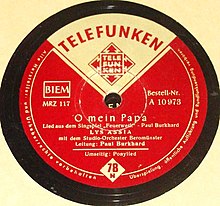O my papa
O mein Papa (or: Oh my Papa ) is the title of a chanson from the musical comedy The Black Pike , which premiered on April 1, 1939 and which later became a hit and an evergreen .
History of origin
The Swiss composer Paul Burkhard (1911–1977) wrote a total of five titles for the musical The Black Pike with Jürg Amstein and Erik Charell . The climax of the comic revue operetta is the song O mein Papa , performed for the first time by Erna Lenser in - given - broken High German with an Eastern European accent during the premiere on April 1, 1939 at the Schauspielhaus Zurich . In total, the musical had eleven performances here.
Eleven years later, in 1950, the revue operetta was revived. The High German version of the Swiss German original revue was premiered on March 16, 1950 under the title Das Feuerwerk in the Munich State Theater on Gärtnerplatz . From this, the Swiss pop singer Lys Assia (* 1924; † 2018) chose the sensitive O mein Papa , which she sang for the first time in 1950 in the Bernhard Theater in Zurich . This request concert was also broadcast on Swiss radio; among the audience was her seriously ill father, who died that same night. The lyrics are about a young woman who sings in admiration about her father, who was a famous circus clown and artist.
Version of Lys Assia
Lys Assia's version was written in March 1950 with the Radio Beromünster studio orchestra under the direction of composer Paul Burkhard . The single O mein Papa / Ponylied (Decca 49 124, Telefunken 10 973) appeared in the German hit parade in January 1954 . In the list for May 1954 of the magazine "Der Automatenmarkt", which evaluated the use of jukeboxes, it was in fourth place.
The filming of the revue under the title Fireworks with Lilli Palmer's (1914–1986) version of the song ensured further success of the Assia single from its premiere on September 16, 1954, which rose to number 7 on the German charts in August 1954.
With the recording, Lys Assia gained great fame in Germany, and the successor hit Schwedenmädel already reached first place in the German charts in May 1954. Assia released 6 other versions of O mein Papa , including 1960 for Philips (345215 PF), 1964 for Telefunken (55973) and in November 2008 for Cariblue (LP Refrain des Lebens ; 14030 2).
In 1953 Rita Wottawa brought out another German-language version. In Germany, the instrumental versions by Ray Anthony (June 1954) and Harry James (September 1954) made it onto the charts.
Million seller
The British trumpeter Eddie Calvert recorded an instrumental version on July 29, 1953 under music producer Norrie Paramor in Abbey Road Studios . This came on December 18, 1953 in the British charts, where it was number one for nine weeks from January 8, 1954. At the same time, it advanced to sixth place in the USA, making it the first top hit from Great Britain in the American charts. Calvert's trumpet version, supplemented by a choir, sold over 3 million copies, one million of which as early as early 1954. John Turner (Jimmy Phillips) and Geoffrey Parsons wrote the English text almost verbatim from the German-language original. Calvert's version was the first million-seller of a British solo instrumentalists in the US. It was also the first million seller from the Abbey Road recording studios .
On December 12, 1953, Eddie Fisher was in the recording studio with the Hugo Winterhalter orchestra to create a vocal version entitled Oh! Record My Pa-Pa (Victor 5552). This spent 8 weeks at number 1 in the US and sold over a million copies.
More cover versions
The song has been translated into 42 languages, Coverinfo lists 67 cover versions . Wilma Landkroon sang a Dutch version of Oh mijn Papa , which can be heard on the 1992 CD 19 Successen . In 2012, Dodo Jud covered the version of Lys Assia in the Swiss television program "Cover Me". Composer Burkhard once said, prognostically, about his work: “A melody should stick, I'm not even unhappy if, in the case of 'O my Papa'… it even becomes a hit and goes all over the world. It is important to me that the audience keeps my songs in their ears. "
Individual evidence
- ↑ Ernst Probst: Super women 10. Music and dance. Grin, Munich 2001, p. 36
- ↑ Swiss radio and television from September 7, 2012, O my papa: For Lys Assia happiness and sorrow at the same time ( Memento from July 8, 2013 in the web archive archive.today )
- ↑ May 1954: Heavy Movement on germanchartblog
- ↑ Manfred J. Franz: Deutsche Musikcharts 1954. Net-Clip, Berlin 2012, p. 67. The listing in this book does not correspond to the charts officially published by the “Automatenmarkt”. see also the preliminary remark on the sources by Manfred J. Franz.
- ↑ The latter version was produced by Michael Leonhard Dierks and Jürgen Westphal in the Sunshine Studio in Graz and in the WetCat Studio (Uslar).
- ^ Joseph Murrells: Million Selling Records: From the 1930's to the 1980's. An Illustrated Directory. Arco Pub., Batsford 1985, p. 77
- ^ Joseph Murrells: Million Selling Records: From the 1930's to the 1980's. An Illustrated Directory. Arco Pub., Batsford 1985, p. 78
- ↑ Episode 7: Lys Assia and Dodo Jud - Rap meets Evergreen ( Memento from August 26, 2012 in the Internet Archive ), Swiss television
- ↑ Dieter Schnabel: Sometimes someone has to be there to remember. Sheets of memory of composers, writers and theater people. Book on Demand, Norderstedt 2003, p. 21

